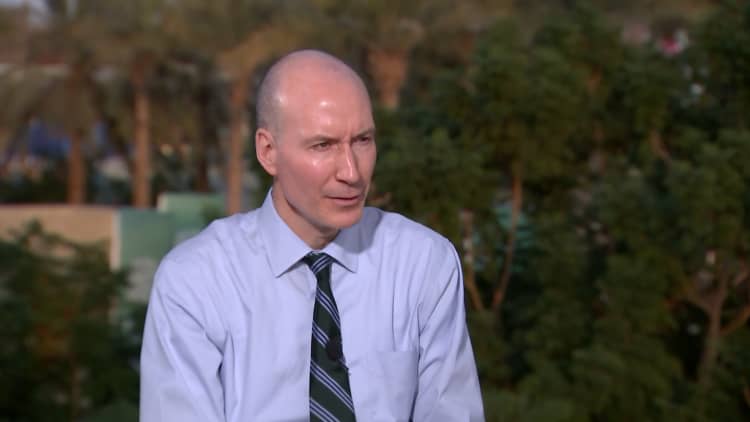
China’s current emissions reduction targets are not as strong as they need to be, U.S. Deputy Secretary for Energy David Turk said Monday.
“I think every country needs to take a look at what it’s doing, especially in its implementation phase,” Turk told CNBC’s Steve Sedgwick at the COP28 summit.
“I’ve looked at the numbers for many, many years now. I don’t think their NDC is as robust and ambitious as it needs to be. They’re doing an awful lot in EVs and solar and wind, but if you’re also building out coal at the scale they’re doing, that’s not going to be good enough.”
“NDC” refers to “nationally determined contributions,” targets on emissions reductions that are submitted to the United Nations Framework Convention on Climate Change by countries every five years under a plan agreed at the landmark COP21 summit in Paris in 2015.
Climate Action Tracker, an independent scientific review project, currently rates China’s climate targets as “highly insufficient,” and the U.S.’s as “insufficient.”
Turk said that at the recent Sunnylands meeting on climate change between the U.S. and China, U.S. Special Presidential Envoy for Climate John Kerry had “put out his hand for the Chinese to embrace and to try to work together in areas where it makes sense to work.”
The U.S. and China need to “raise both of our levels of ambition, because we’re the two biggest economies and the two biggest emitters right now,” Turk added.
Companies must ‘step up’
On the attendance of companies like Exxon at COP, Turk told CNBC: “I think it is significant. And I think everybody needs to be at the table, we all need to be part of the conversation. But we also need to ask each other tough questions as well.”
Turk pointed to an agreement announced on Saturday which will crack down on methane emissions in the U.S. oil and gas industry, building on a 150-country pledge on the issue.
Turk said cutting methane emissions from oil and gas was the “biggest no brainer out there,” but it had taken too long to make progress.
Another example of a tough question that needed addressing, Turk said, was on Scope 3 emissions — a measurement of direct and indirection emissions.
“Many oil and gas companies, their Scope 3 emissions are 10 times Scope 1 and Scope 2 combined. So we need to have a real conversation on Scope 3, what is the plan to reduce those Scope 3 emissions? And that’s, I think, what’s missing at a national and COP and at a corporate level as well,” he said.
“I think companies really need to step up… They can’t just say, Oh, we’re just providing a product. What people do with the product — they’re going to burn that product, it’s going to release CO2 into the atmosphere, 63% of our emissions right now are from oil and gas. That’s an awful lot of emissions.”
Oil and gas companies are currently “making an awful lot of profit,” but only 1% of spending globally for clean energy is coming from oil and gas companies, he said.
“So follow the money, where are they investing? And some companies are investing, some companies aren’t investing as much.”
The U.S. government hopes that incentives, including the Inflation Reduction Act and the large subsidies included in it, will encourage more investment across carbon capture, hydrogen, geothermal, offshore wind and “other areas that oil and gas companies could be hugely, hugely helpful on,” he said. It is also important to “follow the money” to see where companies and influential corporate leaders are creating an uneven playing field through lobbying, he added.
Science is science
Turk finally addressed recent controversial comments made by COP28 President Sultan al-Jaber, who recently claimed there was “no science” behind targets for a phase out of fossil fuels.
“Science is science and numbers are numbers, right? And we’re seeing the worst impacts already that we’ve seen of climate change, but it’s only going to get worse. Even if we get our act together, we’ve got a limited amount of carbon budget. Right now we’ve got to make the numbers add up to get to net zero by mid century.”
“If people are not acknowledging that, appreciating that and have credible plans, including Scope 3 emissions from the oil and gas sector, then that’s not really taking these issues head on.”
 EU News Digest Latest News & Updates
EU News Digest Latest News & Updates


